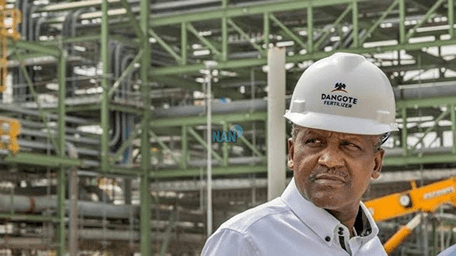A scarcity of crude oil may cause Dangote Oil Refinery’s much-anticipated July entry into the fuel supply market to be delayed, according to industry insiders.
The Lekki, Lagos-based refinery, with a 650,000 barrels per day (bdp) capacity, was supposed to start operating in July to drastically lower Nigeria’s dependency on imported fuel.
But worries are growing that Dangote may not be able to reach its goals for refining petrol due to a shortage of easily accessible crude oil.
A phone source in the oil trading industry stated, “The refinery is yet to receive the required volumes of crude oil needed to refine PMS for the July takeoff.”
The Dangote refinery is not expected to fulfill the July target, according to Jide Pratt, country manager of Trade Grid, which provides support to a large network of independent dealers throughout Africa.
According to Pratt, “postulations about how the premium motor spirit (PMS) will be sold in USD are unattended to, and the issue of crude supply is still a major issue.”
“A safe assumption might be, at best, August or September, and at worst, December,” he continued.
Given that the company presently maintains trade account receivables with merchants that span more than 160 days, it is evident that the subsidy is still in place and that selling to NNPC is less likely. Given its operational expenses and interest payments, the Dangote Refinery is a commercial concern and is unlikely to support its line of credit sales, according to Pratt.
Expert in financial planning Kalu Aja wondered why Nigeria, the continent’s biggest oil exporter, couldn’t produce enough oil for Dangote.
“If Dangote needs crude, Nigerian National Petroleum Company (NNPC) should support its 20 percent investment by giving Dangote its oil equity,” Aja said.
According to Hector Igbikiowubo, editor of Sweet Crude Reports, ensuring the Nigerian state’s energy security is the primary reason for the NNPC refineries’ operation.
“Now, the question is, why isn’t the Dangote Refinery receiving all 445,000 barrels per day from the NNPC for refining?” Igbikiowubo enquired during a Channels TV show.
Femi Soneye, the chief communication officer of NNPC Ltd., did not answer calls, therefore attempts to get in contact with him were unsuccessful.
Since the refinery is situated in the Lekki Free Trade Zone, it has been widely anticipated that NNPC Ltd, which owns a 20 percent stake in the project, will provide the majority of Dangote’s needs for oil. This could be unrealistic though.
The NNPCL had committed its crude to other firms, according to Edwin Devakumar, vice president of Dangote Industries Limited, in an interview with S&P Global Commodity Insights last year.
The vice president of Dangote Refinery withheld information regarding the other organisations that were to receive the crude oil from the oil company; but, in August 2023, the NNPCL revealed that it had signed a $3 billion crude oil-for-loan agreement with the African Export-Import Bank.
As part of the agreement, the business promised the bank that it would repay the debt with future oil output.
Only US and Nigerian crude grades have been delivered to Dangote Refinery thus far. However, as it increases production, traders have predicted that it may seek out alternate-term contracts with other suppliers more frequently.
Nigeria’s refiners should benefit from a plentiful supply of oil given its position as the continent’s top oil producer. The reality, though, is far different.
There are now 25 licensed modular refineries in Nigeria. There are five that are in operation, producing naphtha, kerosene, black oil, and diesel.
Modular refineries are more straightforward and require a substantially lower initial investment than their full-scale conventional counterparts. Ten or so are almost finished, while the remaining ones have only been granted permission to open.
Because of the shortage of crude and other problems, the remaining work is still on hold.



